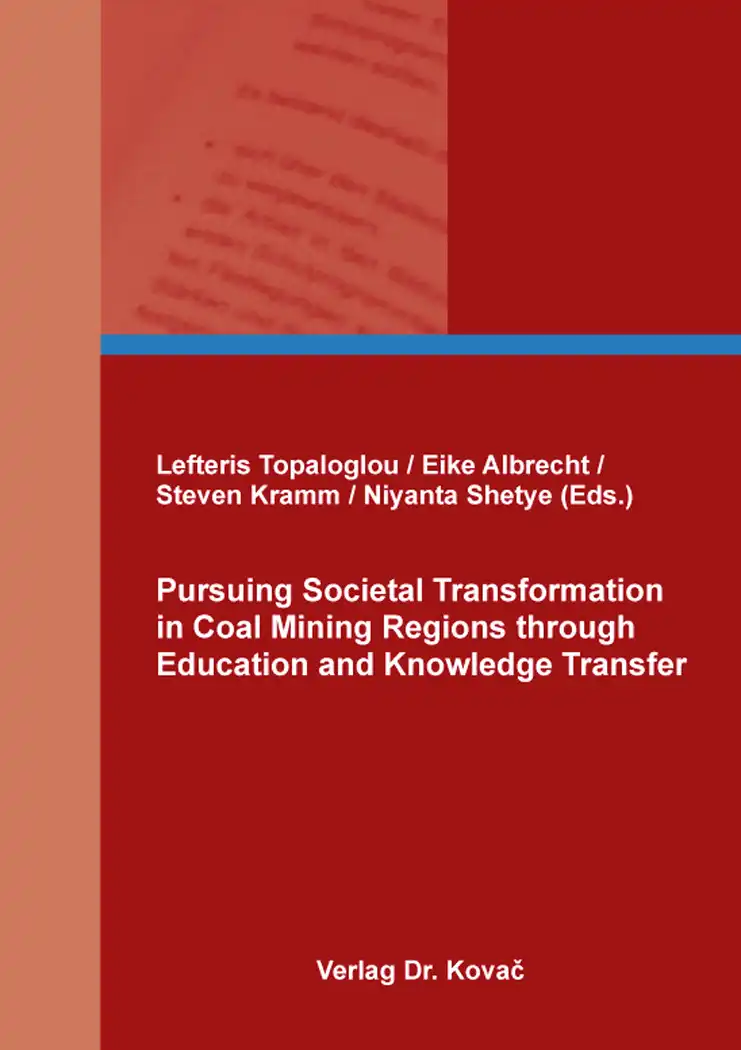Open Access (Rechtswissenschaft / Verwaltungsrecht & Sozialrecht) Pursuing Societal Transformation in Coal Mining Regions through Education and Knowledge Transfer von Lefteris Topaloglou / Eike Albrecht / Steven Kramm / Niyanta Shetye (Ed.)
Pursuing Societal Transformation in Coal Mining Regions through Education and Knowledge Transfer
– in englischer Sprache –
Umweltrecht in Forschung und Praxis
Hamburg 2024, 220 Seiten, ISBN 978-3-339-13628-2 (Print) | ISBN 978-3-339-13629-9 (eBook)
This volume is the outcome of a scientific workshop on Pursuing Societal Transformation through Education and Knowledge Transfer in Kozani. The workshop was carried out in December 2022 in the framework of a cooperation project financed by the German Academic Exchange Service (DAAD). The project brought together Brandenburg University of Cottbus – Senftenberg (BTU), Germany, and the University of Western Macedonia (UOWM), Kozani, northern Greece.
Climate change stands as one of the most pressing challenges of our time. Halting global warming necessitates significant changes in politics, law, economics, and technology. However, the success of this transformation hinges on having an informed, educated, and engaged society. This imperative is underscored by international agreements, such as Article 6 of the UNFCCC and Article 12 of the Paris Climate Agreement, which highlight the importance of climate education. To achieve these goals, it is essential to establish effective and goal-oriented communication between universities and the general public, fostering a collaborative educational and knowledge transfer landscape for the broader population.
Both UOWM and BTU are located in regions historically tied to lignite mining, which is being phased out due to European and national climate policies. This volume contains various contributions, including case studies of the areas around Kozani and Cottbus/Lusatia, which share similar starting points. In both regions, the cessation of coal usage, industrial decarbonization, and the shift to new economic sectors are paramount societal concerns. Cottbus and Kozani find themselves at the heart of regions undergoing profound changes due to the discontinuation of fossil fuels. Lignite has been a staple of energy production and heating in Cottbus and the surrounding Lusatia region for almost a century, while coal mining formed the basis of energy production in the Kozani area. Consequently, there is an urgent need for decarbonizing production processes and energy generation.
Moreover, Western Macedonia and Lusatia are participants in the Initiative for Coal Regions in Transition, which supports the transition of EU lignite regions toward a low-carbon economy. This initiative also facilitates the exchange of experiences and the establishment of contacts for joint projects. While these regions share significant similarities and challenges in structural change, there are notable differences, particularly in political and financial support. The shift away from lignite coal mining and the transition to other economic sectors have substantial effects on the local population's economic well-being. To foster acceptance of these transformation measures, there is a need for information dissemination, education, and the reinforcement of sustainability principles. The general idea is to prepare former coal workers for employment in alternative sectors, including other industries, startup ventures, renewable energy expansion, or the tourism sector.
Another critical issue is gaining the population's acceptance during this comprehensive transformation process, especially in regions like the East German coal areas, which are undergoing this process for the second time. However, the lignite phase-out also presents opportunities, such as the large areas of former lignite mines that can be repurposed for large-scale renewable energy projects. Leveraging the knowledge, skills, and energy-related infrastructure of an energy region can aid in the transformation and decarbonization of energy production and industries. Achieving a transition to acceptance of the shift toward a sustainable economy and industry necessitates knowledge transfer and scientific education.
The Kozani workshop facilitated a robust exchange regarding the current state of structural change, particularly in the coal sector, and the associated social challenges in both regions. The workshop primarily focused on research and discussions surrounding climate education, environmental education, environmental law, and environmental policy. Participants included researchers, experts, and students from both universities, representing various perspectives from the central transformation regions in Greece and Germany, with a particular emphasis on social science, environmental science, and law. These workshop proceedings provide insights into these perspectives, which are crucial for understanding objections, delays, deficiencies, and points of contention in the transformation process. Ultimately, this process aims to create a win-win situation for the former coal regions and serve as a model for transformation processes related to phasing out fossil fuels in other parts of Europe and the world. a low-carbon, climate-resilient society while increasing understanding and
It is important to note that all contributions in this volume reflect the personal opinions of their…
EnergiewendeGerechter ÜbergangJust TransitionKohleKohleausstiegÖkologische WendeRegionalstudienStruktureller WandelUmweltrecht
